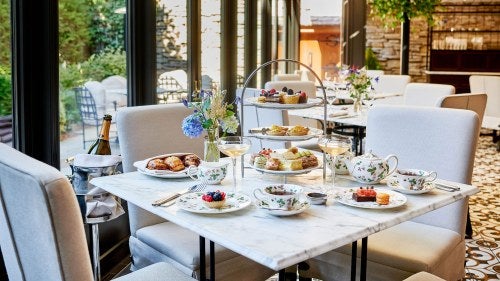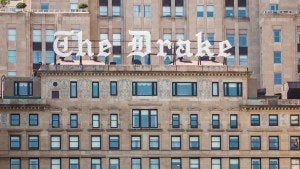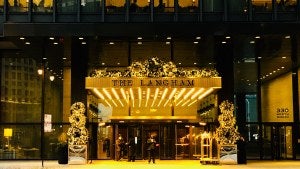Chicago Businesses Embrace British Tea Traditions

Amid a Brit-centric TV landscape and declining alcohol consumption, more and more Americans are embracing afternoon tea. Here’s where to enjoy it in Chicago.
From a cozy English-style inn to a decadent downtown hotel, Chicagoans love engaging in the British tradition of afternoon tea. As young adults show less interest in alcohol than other generations and Brit-centric media like “Bridgerton” become smash hits, afternoon tea experiences are only getting more popular across the United States, including in the Windy City.
Afternoon tea has English roots going back centuries, and by sipping tea and eating tiers of treats, Chicagoans can step into another culture, experiencing the same time-honored tradition that British royalty did hundreds of years ago.
“People are delighted by the pomp and circumstance that permeates British culture,” James Barnett, the general manager of the Deer Path Inn in Lake Forest, told ChicagoGlobal. And, at the Deer Path and beyond, that culture means tea.
An English Tradition Exported Abroad
Afternoon tea is traditionally a small meal between lunch and dinner that includes tea, pastries, and finger sandwiches, and it dates back at least to the mid-1800s. Some historic documents suggest that afternoon tea was being served as early as the 1740s, but the most popular origin story holds that the seventh Duchess of Bedford, Anna Maria Russell, invented the practice sometime around 1840. Because urbanization and industrialization were pushing dinner later into the night, a large gap developed between the day’s two main meals, causing the duchess to develop a “sinking feeling” in the late afternoon — one that could only be remedied by snacking on tea and cakes. Regardless of its true genesis, though, afternoon tea these days is a quintessential English tradition.
In recent years, that tradition has grown more popular across the globe. A 2022 Pinterest report declared that “afternoon tea is the new happy hour,” and the social media platform’s 2024 report found that searches for “afternoon tea party ideas” were up 165%.
“In 2022, people will choose Darjeeling with a friend over drinks after work,” according to the Pinterest report. “Afternoon tea is more than a meal — it’s a moment, an aesthetic, a pose. Searches for ‘tea party aesthetic’ and ‘drinking tea pose’ are climbing across all age groups.”
That social media-ready aesthetic is one explanation for tea’s growing appeal: In the age of Instagram, people place a premium on photo-friendly activities, and afternoon tea, with its picture-perfect finger foods, fits that bill well. Another explanation is that tea is an appealing alternative to alcohol for America’s increasingly teetotal young people. A 2023 Gallup poll found that the share of 18- to 34-year-olds who drink alcohol had fallen by 10 percentage points in the preceding two decades — which could be driving them away from bars and into tea rooms. Popular shows that center on British culture, like “The Great British Bake-Off” and Netflix’s “Bridgerton,” also have a hand in this rise: According to Pinterest’s 2024 report, searches for “Bridgerton tea party” were up 430% in the past year.
— 2024 Pinterest report.
Whatever the reason, afternoon tea’s increasing popularity certainly extends to the Windy City. According to Destination Tea, an afternoon tea directory for the U.S., Illinois has 46 places where people can get the afternoon tea experience, the majority of them in Chicagoland. Downtown hotels like The Langham, The Drake, and The Peninsula all offer popular high-end tea seatings, but the region’s most authentic experience may be at the Deer Path Inn, a four-diamond property in the suburbs that prides itself on thoughtful reproduction of British culture.
“Today, afternoon tea is one of our most popular dining experiences, and seatings regularly sell out,” said Barnett, the inn’s manager. “Our tea service has become so popular that we also offer a ‘take out’ option that guests can pre-order to pick up and bring the Deer Path Inn experience home with them.”
A Historic Tradition in a Modern City
Located on Chicago’s North Shore, the Deer Path Inn is a historic restaurant and inn that originally opened in 1929. And Barnett says the inn’s current afternoon tea service, developed in 2016, is a “staple” of the Deer Path experience.
“We worked closely with an English Master of Tea, whose family has been in the tea trade since 1842, to ensure we upheld the traditions of a quintessential English tea service,” Barnett said.
Barnett said that, while demand for the afternoon tea experience is strong year-round, from Thanksgiving to January the inn offers holiday-themed afternoon teas that are especially popular. The weeks preceding and after Mother’s Day also see an uptick in demand.
Other afternoon tea establishments around the city offer a rich history, as well. The Drake, which is perhaps the best-known tea destination within the city limits, has been considered one of the city’s most opulent hotels since the 1920s — and it even hosted Princess Diana in 1996. The suite she stayed in, which was then the presidential suite, is now named in the late royal’s honor.

The Drake hotel in Chicago.

The main entrance to Chicago's Langham hotel.
The Langham, another luxurious downtown hotel, comes by its tea expertise honestly: The hotel chain opened its first location in London on June 10, 1865. It has been serving afternoon tea for just as long to Britain’s upper crust, and that service is the same one it offers here in Chicago. The hotel even has its own proprietary teas.
The Peninsula, a hotel group founded in Hong Kong, hosts one of Chicago’s most expensive teas (at $140 per person) and is credited with bringing British afternoon tea to Hong Kong. The original Peninsula opened in Hong Kong in 1928, when the region was still a British colony, and it quickly began serving afternoon tea to the British soldiers and settlers who had business in the city. But locals took the British tradition and made it their own. By the 1960s and 70s, afternoon tea was making its way into the mainstream in Hong Kong, whose native-born residents took the traditional afternoon tea delicacies of the upper class and gave them a local — and more affordable — twist, adding elements like Hong Kong-style French toast and milk tea.
The Deer Path Inn, too, imbues a sense of the local into its spin on the British classic. Barnett said that, to celebrate the inn’s 95th anniversary, there will be a special afternoon tea on Oct. 14 that intertwines “the glamour of the 1920s,” in a nod to the inn’s origins, with historical information about Deer Path Inn and the surrounding Lake Forest neighborhood. And that glamour, he adds, is part of the appeal.
“Afternoon tea feels like the ultimate indulgence — it’s all about refinement and slowing down to enjoy the finer things in life,” Barnett said.
This story first appeared in the ChicagoGlobal newsletter, a joint project of Crain's Chicago Business and the Chicago Council on Global Affairs.

